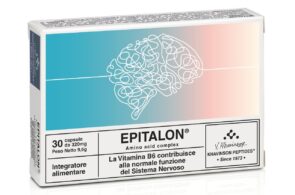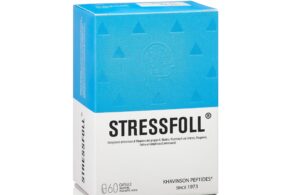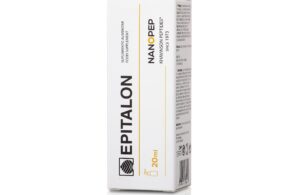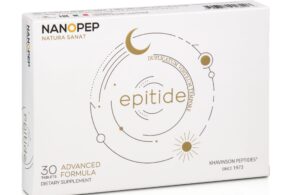How peptide helps improve learning and memory
- Alzheimer’s affects the memory and learning areas of the brain
- Short peptides are of great help in Alzheimer’s cure research
- Nanopep Stressfoll® protects brain functions
Alzheimer’s disease is the most common form of dementia. Named after the German neuropathologist and psychiatrist Alois Alzheimer, who first described the disease in 1906, this neurodegenerative syndrome is typical of advanced age, and involves a gradual and irreversible loss of cognitive functions.
Also known as Alzheimer’s disease or simply Alzheimer’s disease, Alzheimer’s disease is a form of dementia that usually occurs in old age, but can also affect young individuals, between 30 and 60 years (early onset Alzheimer’s or juvenile Alzheimer’s).
Alzheimer’s affects the memory and learning areas of the brain
The most characteristic symptoms of Alzheimer’s are memory deficits, difficulty in learning, speech problems, personality changes, lack of initiative, confusion, disorientation, and loss of reasoning and judgment skills.
At the end of 2022, the World Health Organization (WHO) reported that 55 million people live with dementia worldwide, and there are nearly 10 million new cases every year. Alzheimer’s disease is the most common form of dementia and may contribute to 60-70% of cases.
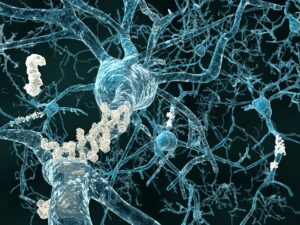 The underlying cause of Alzheimer’s would appear to be linked to altered metabolism of a protein, the beta amyloid precursor protein (called APP) which altered metabolism leads to the formation of a neurotoxic substance – beta amyloid – that slowly accumulates in the brain causing progressive neuronal death. Some experts believe that at the origin of the disease there is a combination of various factors, including genetics, environmental factors, familiarity and lifestyle.
The underlying cause of Alzheimer’s would appear to be linked to altered metabolism of a protein, the beta amyloid precursor protein (called APP) which altered metabolism leads to the formation of a neurotoxic substance – beta amyloid – that slowly accumulates in the brain causing progressive neuronal death. Some experts believe that at the origin of the disease there is a combination of various factors, including genetics, environmental factors, familiarity and lifestyle.
Two typical lesions characterize Alzheimer ’s disease microscopically: the senile plates (amyloid plaques) in the extracellular area, formed by the accumulation of the ß-amyloid peptide (Aß) and intracellular neurofibrillary clusters of hyperphosphorylated tau protein in the cerebral cortex and subcortical grey matter.
Unfortunately, there is currently no specific treatment available for Alzheimer’s disease, where a specific treatment is defined as a therapy capable of recovering from the disease. However, several symptomatic, pharmacological and other treatments can slow the progression of dementia and improve the quality of life of patients.
Short peptides are of great help in Alzheimer’s cure research
Peptides are cellular components that perform fundamental biological functions, composed of sequences of amino acids (residues). Short peptides are formed by the union of 2, 3 or 4 residues. The study of peptides as important bioregulators began in 1973 following research conducted in Russia by Professor Vladimir Khavinson’s team, whose work demonstrated the great usefulness of these molecules for the body’s proper functioning. Short peptides are now available for a wide variety of applications, including the use for cosmetics, helping us to stay healthy and improve our quality of life.
The wide variety of short peptide products available today makes it possible to have powerful weapons at one’s disposal to contain the advancement of many unavoidable biological processes. Short peptides have numerous advantages over their larger analogues. In particular, cost-effective synthesis on both a small and large scale, wide chemical diversity, ease of modification, high bioactivity, absorbability, accessibility, tunable functionalisation, high molecular selectivity and specificity, biodegradability and biocompatibility, high safety and low toxicity.
In a recent study conducted by neurologist Jack Jhamandas (University of Alberta, Canada) and his team, it was found that injecting daily peptides into mice showing symptoms of Alzheimer’s disease, significantly improved the animals’ condition after only five weeks of treatment. The peptides’ mechanism of action causes not only a reduction in the accumulation of beta amyloid, decreased levels of inflammation markers in the brain, but also an increase in memory.
The peptide called AC253, discovered by this team of researchers was able to block the attachment of beta-amyloid to a brain cell receptor called the amylin receptor, and thus inhibit its toxic effects, as shown by an improvement in spatial memory. Due to the difficulty of absorption of this large peptide, the scientists cleaved the compound and found two short peptides that had the same effect of the AC253.
These two small molecules crossed the blood-brain barrier easily and protected the brain against beta-amyloid injury, and improved memory-testing results, also reducing the level of inflammation in the brain.
The short peptides used for the experiment are easy to handle, inexpensive to produce and are able to permeate cell membranes more quickly. Based on the successes achieved, Dr. Jhamandas’ team has started a study for the creation of a new product to be taken orally, in a version that can also be tested on humans. Another breakthrough in research on short peptides already used as key molecules in many dietary supplements.
Nanopep Stressfoll® protects brain functions
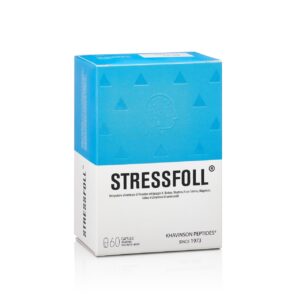 The brain is an organ of fundamental importance, which controls thoughts, memory and language, the movements of the arms and legs and the functioning of all the organs present in the body, regulates breathing and heart rate, and determines reactions to stressful events that may occur in daily life.
The brain is an organ of fundamental importance, which controls thoughts, memory and language, the movements of the arms and legs and the functioning of all the organs present in the body, regulates breathing and heart rate, and determines reactions to stressful events that may occur in daily life.
After a certain age, which varies from person to person, there is a decline in brain function due to many factors including changes in brain chemicals (neurotransmitters that carry information), changes in the nerve cells themselves, accumulation of toxic substances in the brain over time and hereditary alterations.
AEDG (EPITALON®) and EDR are two effective short peptides active in the Nanopep Stressfoll® supplement, specifically designed for normalising the functional state of the brain. These active ingredients are bioregulators with very powerful physiological effects.
Stressfoll® also contains various vitamins, such as Thiamine (B1), Niacin (B3), Pyridoxine (B6), Biotin (B8), Choline and Selenium, very important substances for maintaining a good state of health of the brain, with special regards to:
- Boost memory and concentration levels
- Support mental potential
- Stimulate cognitive functions
- Regulation of neuronal functions and trophism
- Protection against various neurodegenerative diseases
- Stimulation of the central nervous system
- Help coping with mental and emotional stress
All these features of Stressfoll® enhance the activation and normalisation of the brain’s functional reserves and lead to a cascade of positive effects, helping to fight existing diseases and protect against new ones.
Do you want to become a distributor of Nanopep products? Fill in the form on this page: https://nanopep.net/inquiry/







